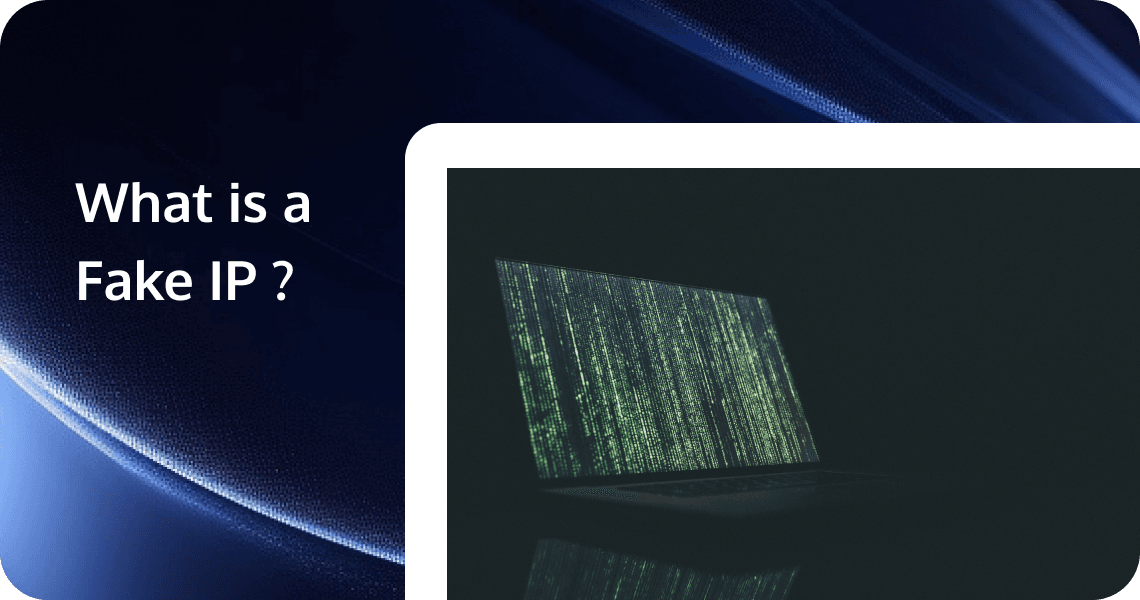Understanding Fake IP Addresses: Uses, Risks, and Implications

In the vast landscape of the internet, every device is identified by a unique address known as an IP (Internet Protocol) address. This digital identifier serves as a crucial component in enabling communication between devices across networks. However, in recent years, the concept of "fake IP addresses" has gained significant attention, both for its potential benefits and risks. This article delves into the world of fake IP addresses, exploring their nature, applications, and the complex web of implications they bring to the digital realm.
What is an IP Address?
An IP address is a numerical label assigned to each device connected to a computer network that uses the Internet Protocol for communication. In simpler terms, it's like a home address for your device on the internet. An IP address, or Internet Protocol address, is a unique numerical label assigned to each device participating in a computer network that uses the Internet Protocol for communication. It serves two main functions:
- Identification: It uniquely identifies a device or host on the network. No two devices on the same network should have the same IP address.
- Location Addressing: It provides the location of the device on the network. This helps in routing data across the network from one device to another.
There are two versions of IP addresses in use today:
- IPv4: This is the older version, and it uses a series of four numbers separated by periods, like 192.168.1.1. Because of the growth of the internet, we've nearly run out of these addresses.
- IPv6: This is the newer version, and it uses a series of numbers and letters separated by colons, like 2001:0db8:85a3:0000:0000:8a2e:0370:7334. It was introduced to deal with the long-anticipated problem of IPv4 address exhaustion.
What is a Fake IP?
A fake IP address, on the other hand, is an IP address that is deliberately used to mask the true IP address of a device. This can be achieved through various methods, each with its own set of purposes and potential consequences.
At its core, a fake IP address is a technique used to conceal or alter the true IP address of a device. This process involves presenting a different IP address to the outside world than the one assigned to the device by its internet service provider (ISP).
It's important to distinguish between fake IP addresses and IP masking. While both serve to hide the true IP address, IP masking typically refers to the legitimate use of technologies like VPNs or proxy servers to enhance privacy or bypass geo-restrictions. Fake IP, on the other hand, often carries a connotation of deception or potential malicious intent, especially in the context of IP spoofing.
How to Get a Fake IP Address?
The creation of fake IP addresses can be accomplished through several methods:
- Virtual Private Networks (VPNs): VPNs are perhaps the most widely used and accessible method for changing one's IP address. They work by creating an encrypted tunnel between the user's device and a server operated by the VPN provider. All internet traffic is routed through this tunnel, emerging from the VPN server with its IP address. This not only masks the user's true IP but also encrypts their data, providing an additional layer of security.
- Proxy Servers: Proxy servers act as intermediaries between a user's device and the internet. When using a proxy, requests from the user's device are sent to the proxy server, which then forwards them to the destination. The responses are sent back to the proxy, which relays them to the user. This process effectively hides the user's true IP address, as the destination sees only the IP of the proxy server.
- TOR Network: The Onion Router (TOR) network is a sophisticated system that provides anonymity by routing internet traffic through a series of nodes. Each node only knows the IP address of the previous and next node in the chain, making it extremely difficult to trace the source of the traffic. While highly effective for anonymity, TOR can significantly slow down internet speeds due to the multiple routing hops.
- IP Spoofing Techniques: IP spoofing is a more technical and potentially malicious method of using a fake IP. It involves creating IP packets with a source address that is not the actual source of the packet. This technique can be used for various purposes, from benign network testing to malicious attacks like Distributed Denial of Service (DDoS).
Legitimate Uses of Fake IP Addresses
While the term "fake IP" might carry negative connotations, there are several legitimate and beneficial uses for IP masking technologies:
- Protecting Online Privacy: In an era of increasing digital surveillance and data collection, many individuals use VPNs or other IP masking techniques to protect their online privacy. This can help prevent ISPs, websites, and potential hackers from tracking online activities.
- Bypassing Geo-restrictions: Many online services, including streaming platforms and news sites, restrict access based on geographic location. Using a VPN to change one's apparent location can allow access to content that would otherwise be unavailable.
- Testing and Development Purposes: Web developers and network administrators often use IP masking techniques to test how their systems respond to traffic from different locations or to simulate various network conditions.
- Network Security Testing: Cybersecurity professionals may use IP spoofing techniques to test the robustness of network defenses, identifying potential vulnerabilities before malicious actors can exploit them.
What are the Risks of Fake IPs?
Fake IP addresses represent a double-edged sword in the digital world. On one hand, they offer powerful tools for protecting privacy, circumventing censorship, and enabling important testing and development work. On the other, they can be misused for cybercrime, deception, and evasion of legal responsibilities.
Risks and Potential Misuses of Fake IP Addresses
Despite their legitimate uses, fake IP addresses can also be employed for nefarious purposes:
- Cybercrime and Hacking: Malicious actors often use fake IPs to mask their identity while conducting cyberattacks. This can include activities like hacking, phishing, or spreading malware.
- Identity Theft: By using a fake IP, criminals can potentially access sensitive information or impersonate others online, leading to identity theft.
- Evading Law Enforcement: Individuals engaged in illegal activities may use fake IPs to hide their online activities from law enforcement agencies.
- Spreading Misinformation or Engaging in Online Harassment: Fake IPs can be used to create multiple online identities, which can be leveraged to spread misinformation or engage in coordinated harassment campaigns.
Legal and Ethical Considerations
The use of fake IP addresses exists in a complex legal and ethical landscape:
- Laws Regarding IP Address Manipulation: The legality of using fake IPs varies by jurisdiction and context. While using a VPN is generally legal in most countries, IP spoofing for malicious purposes is typically illegal.
- Ethical Use of Fake IPs: There's an ongoing debate about the ethics of using fake IPs. While they can protect privacy and circumvent unjust censorship, they can also be used to deceive or cause harm.
- Corporate Policies on IP Masking: Many companies have policies regarding the use of VPNs or other IP masking technologies on their networks. Some prohibit their use entirely, while others may allow it for specific purposes.
Detection and Prevention of Fake IP Usage
As we move forward in an increasingly connected world, the debate surrounding fake IPs will likely intensify. Balancing the need for online privacy and security with the requirements of law enforcement and corporate responsibility will remain a significant challenge. As the use of fake IPs has become more prevalent, so too have methods for detecting and preventing their use:
- Methods for Identifying Fake IPs: These can include checking for known VPN or proxy IP ranges, analyzing traffic patterns, or using more advanced techniques like browser fingerprinting.
- Tools and Techniques for Network Administrators: Network administrators can employ various tools to detect and block traffic from suspected fake IPs, including intrusion detection systems and specialized software.
- Best Practices for Online Platforms: Many online platforms have implemented measures to detect and prevent the use of fake IPs, especially in contexts where user location is critical (e.g., online banking or region-specific services).
The Future of Fake IP Technology
As technology continues to evolve, so too will the landscape of fake IP addresses:
- Emerging Trends in IP Masking: We're likely to see more sophisticated methods of IP masking, potentially leveraging technologies like blockchain or advanced encryption.
- Potential Technological Advancements: Future developments might include more efficient VPN protocols, improved anonymity networks, or new ways of routing internet traffic.
- Implications for Cybersecurity and Online Privacy: The ongoing cat-and-mouse game between those using fake IPs and those trying to detect them will likely drive innovations in both cybersecurity and privacy technologies.
Ultimately, the key lies in responsible use. Technologies for IP masking, when used ethically and legally, can be valuable tools for protecting individual rights and fostering a free and open internet. However, it's crucial for users
Conclusion
EdgeOne is a cloud-based solution offering comprehensive protection against cyber threats. It provides robust DDoS Protection, a Web Application Firewall (WAF) to block malicious traffic, and advanced Bot Management. It safeguards APIs, manages SSL/TLS certificates, and enforces access controls. The platform adopts a zero-trust security model, offers real-time monitoring, and allows customizable security rules. It uses global threat intelligence for proactive defense, supports compliance standards, and provides multi-layered protection. With scalability, regular updates, and seamless integration with other EdgeOne services, it ensures optimal performance and user experience. We also offer a free trial for you to get started. Click here to begin your journey with us.

